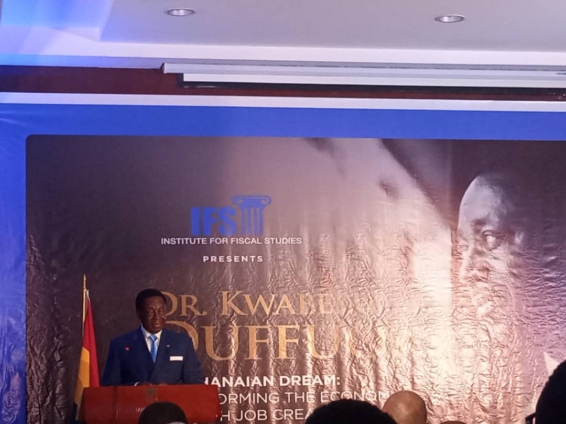A former Finance Minister, Dr Kwabena Duffuor has described as problematic, government’s decision to introduce an electronic transaction levy (E-levy) as an innovative way to replace the scraped road toll.
Speaking at a lecture themed, "Ghanaian Dream: Transforming the Economy through the Creation of Jobs and Opportunities for All," the former Governor of the Bank of Ghana explained that e-transaction is a mode of payment, thus, imposing the tax is unrealistic.
He further added that it will lead to double taxation, since the underlying income would have normally been taxed already.
“It should be noted that taxes/levies are imposed on income, gifts, consumption and held properties or assets. Electronic transfers and payments are none of these.
“This makes the proposed E-levy problematic because it could be fraught with serious implementation challenges. This tax could undermine the Ghanaian Digital Economy,” he said.
The incumbent Finance Minister, Ken Ofori-Atta while delivering the 2022 budget proposed that a 1.75% levy on all electronic transactions effective January 1, 2022.
However, a section of Ghanaians including the Minority in Parliament and some economists have kicked against this proposal.
The opposers argue that the move will intensify the hardships of the average Ghanaian.
But government insists that the new form of taxation will stimulate the growth of the economy and create more jobs.
Dr. Duffuor used the lecture, which also focused on job creation, to suggest key measures that can be adopted by government to bridge the gap.
According to him, the government must invest in Technical and Vocational Education (TVET).
He stated that a country cannot tackle joblessness without priortising education, thus, Ghana must place vocational and technical training at the center of its educational system.
Citing countries like USA, China and Germany, Dr. Duffour said these nations have developed strong manpower through TVET that is continuously growing their economies.
“Vocational education and training-which includes training offered in institutions as well as on the job through apprenticeship-widens the options for skills acquisition by young people and meets and needs of those not suited for traditional education,” he said.
Latest Stories
-
Meet 2 Ghanaian entrepreneurs on a mission to connect 1m African professionals to global companies by 2034
20 mins -
NCA approves Starlink’s satellite broadband application
21 mins -
Government orders FGR to revamp mining operations; assures workers of commitment to their welfare
26 mins -
Arne Slot philosophy could suit Liverpool – Van Dijk
37 mins -
EC replies Mahama: You also appointed someone who was tagged NDC
44 mins -
See colourful outdoor of Prof Naana Opoku-Agyemang as NDC’s running mate
1 hour -
Akufo-Addo commissions 15MWP Kaleo Solar Power Plant
1 hour -
GCB Bank PLC leads African financial integration, hosts ZICB delegation
2 hours -
Empowering Girls in ICT: FAWE Ghana advocates for gender equality in the Tech sector
3 hours -
Rangnick ‘contacted by Bayern Munich’ about manager job
3 hours -
Winneba Youth Choir celebrates 35th Anniversary with Aseda Concert sponsored by Fidelity Bank
3 hours -
Bonwire residents reject Agya Koo’s endorsement of Ejisu NPP MP aspirant
3 hours -
SSNIT to run out of reserves due to deficits – ILO
3 hours -
Lagos officials eye Jospong Group’s eco-friendly waste management module
3 hours -
Photos: NDC outdoors Prof Naana Opoku-Agyemang as running mate
3 hours

